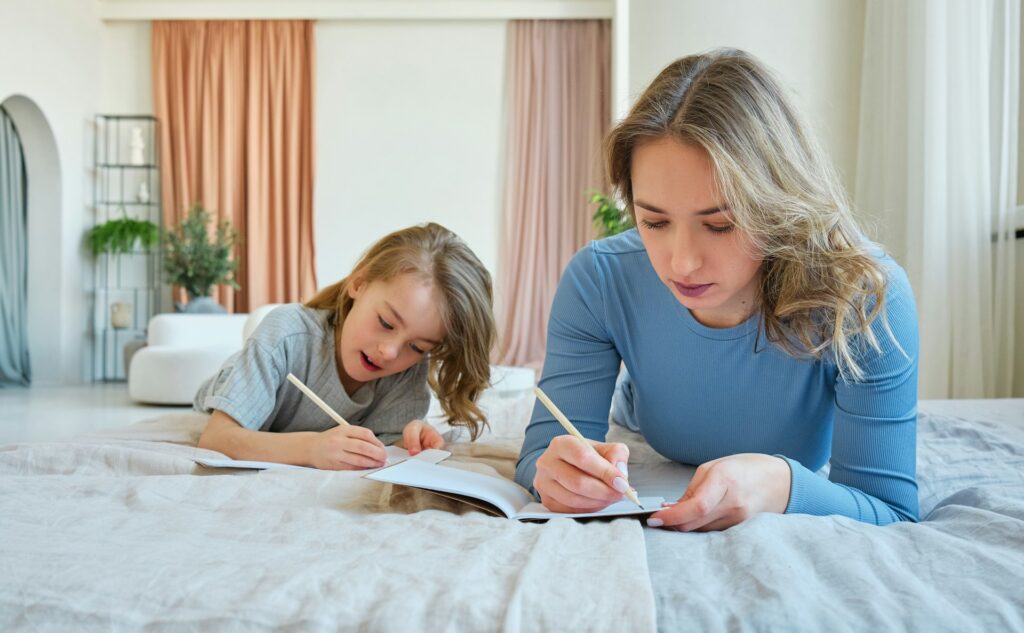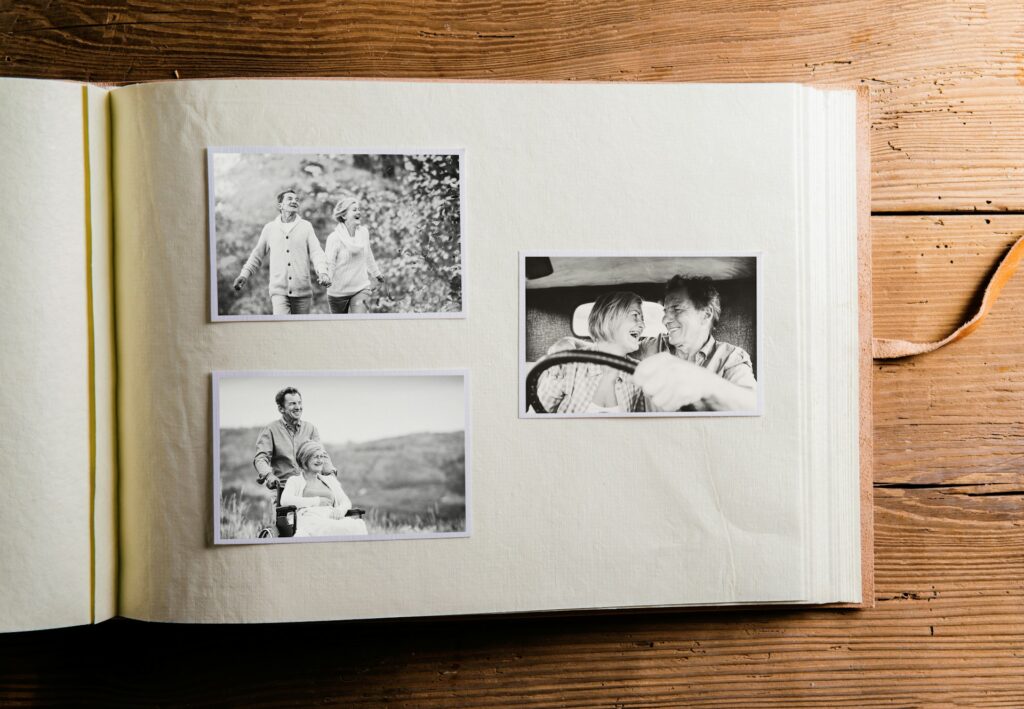If a global pandemic and an impending climate catastrophe have led to anything positive, it’s that many of us have come to realise just how important quality time spent with family is.
But in the modern world, if an occasion isn’t captured, recorded, photographed and shared, did it even happen? And whilst we’re living in an era of ‘collecting memories, not things’, there’s still something rather old school and romantic about preserving cherished memories of family get-togethers into a tangible, collectable form.
Interestingly, the very act of preserving these memories, by getting the family together for a crafts project, helps you create new memories. If you’re keen to do just that, then here are 8 great ideas for preserving cherished family memories.
Start Sending Out A Christmas Newsletter
You’ve probably been on the receiving end of a family newsletter at Christmas and rolled your eyes. Yep; they are often annoying, so impersonal and who wants to read about an oh so boastful litany of other people’s family achievements? If you think about it, Christmas newsletters could even be considered a form of slow social media.
Indeed, as the New York Times points out, “unlike an ephemeral online status update, detailing the quirks of each family member in one place makes revisiting the cards in later years especially rewarding”.
Yep, family newsletters as not only a wonderful way to update and perhaps bore your friends and kindred on what you and your family are up to, but they are a great keepsake to look back in years to come. Jampack your newsletter full of family trivia, highlight individual accomplishments and include some silly anecdotes, too. You might find these newsletters become the most cherished keepsakes of all.

Record Memories On Video & Even Audio Tape
We’re sure you’ve watched You’ve Been Framed; the program that delves into humorous home movies and camcorder calamities. Hours of entertainment watching this show wouldn’t have been possible without families recording special moments and memories.
We say bring back the spirit of those camcorder moments and start recording special or even everyday moments again. You can also harness the power of ever expanding technology and create an audio or videotape that documents memories in your household. This method helps preserve the memories by converting them into files on some sort of media, CDs, DVDs, or flash drives.
Or, if you taped a dinner conversation with your family (consent given first, of course!), you could convert that into an audio file and upload it to the cloud, then future generations would be able to listen and hear the voices of their ancestors, and perhaps have a good laugh in the process.

Create A Digital Time Capsule
Why not embrace modern technology to preserve memories in a uniquely contemporary way? A digital time capsule is rather like its physical counterpart, but instead of burying it in the garden, you’re creating a carefully curated collection of digital memories to be opened at a specific future date.
Start by creating a dedicated cloud storage folder or external hard drive specifically for this purpose. Fill it with photos, videos, voice recordings, and even screenshots of text messages or social media posts that capture the essence of your family life today. Include digital scans of children’s artwork, recordings of their voices, and perhaps some video interviews with family members sharing their thoughts about the present and hopes for the future.
What makes this particularly special is that you can add digital letters from each family member, written to their future selves or to future generations. You might include playlists of the music your family enjoys, digital copies of recipes that are family favourites, or even recordings of your regular family game nights. Consider adding them to a Kapsule on Kapshoo – you can then share them with your loved one and use their input to enhance the story. Pretty neat, huh?
The beauty of a digital time capsule is that you can set a specific ‘opening date’ – perhaps 10 or 20 years hence – and then encrypt the folder until that date arrives. You might even set up an automated email to be sent to family members when it’s time to open it. Imagine the joy and possibly hilarity of future family members discovering what life was like in the 2020s!
Don’t forget to back up your digital time capsule in multiple locations – after all, technology can be rather fickle, and you wouldn’t want these precious memories to be lost to a technical glitch!

Make A Scrapbook
Scrapbooking is a hands-on hobby that not only keeps those idle thumbs busy but also results in something tangible and traditional. And that’s why you’re here, right?
Scrapbooks are great because they show progression throughout your life with your family, and allow you to use a little creativity in their conception. Whilst fads, fashions and new scrapbook trends come and go, a traditional collection of memories still has a certain charm. You can even hand down scrapbooks to future generations; making a gift that packs a seriously sentimental punch.
Making a scrapbook is easy. First, you’ll need the right supplies. To make a scrapbook of your family memories, be sure to pick up some acid-free glue (this will keep your pictures from becoming yellow as they age), some page protectors that fit into your scrapbook, and some plastic or cardstock solid pages that contain pockets for photos.
Once you have your supplies, it’s time to start collecting memories! You can use any kind of memory to document in your scrapbook, but try not to save too much from one year. If you do this, you’ll want to label the different years so that there isn’t any confusion.
Perhaps the most enjoyable part of a scrapbook is that it needn’t only contain photos. Instead, some people like to save receipts or tickets from events that show the date or holiday. You can also cut out interesting articles from newspapers and magazines, and include recipes of your favourite meals as a family, menus of restaurants you love or keepsakes from holidays taken together. The world is your oyster…now, eat it!
Scrapbooking isn’t only for adults, kids love to do it, too! If there are children in your family, let them be involved by giving them their own scrapbook kit. These kits usually come with a few pre-decorated pages, stickers, and sometimes even pens or pencils so that they can draw in their book.
Could there be a more cherished final product?

Make A Family Tree
A family tree is an age-old, visual way to document your lineage, family history and see how everyone is related. Particularly useful for teaching the younger members of the family about their seniors, family trees can make for a wonderful hand-me-down, too.
And here’s something interesting; according to the Guardian, “children who have a strong “family narrative” enjoy better emotional health”. What better reason, then, to create a family one. You’ll need to:
- Decide what type of “tree” you would like. There are many different types that you can choose from, such as a Descendant Tree, Waterfall Chart, a Life Bar Chart and many more types.
- Gather family information such as birth and marriage certificates, census reports, and obituaries of deceased relatives. You can also include photos, documents, and newspaper clippings to make your tree more complete, though the charm of a family tree is in its accessibility, so don’t overload it with data.
- Place the first person who started your family at the top of the tree. From here you can create branches for grandparents, then great grandparents and so on.
- Draw the tree on paper or use a computer program designed to make family trees. Add colour to each generation of your family tree to make it more interesting and easier to distinguish visually.
- Save the completed family tree in a binder with plastic sleeves or store it in a document box with dividers. A lovely idea here is to make copies for family members far and wide.
Create A Timeline Of Your Family’s History
Your family timeline is a great way to keep track of your family history, document important moments in your family tree and delve deep into a fascinating past. Here are the steps to create your family timeline:
- Gather all records of your family’s history, such as birth and marriage certificates, photos, and documents such as marriage licenses and census reports. One place to store these is in a three-ring binder with pockets on the inside for protection.
- Make a list of all the people in your family tree with birth and death dates, as well as marriage dates and locations.
- Fill out the information you have on each person, where they were born and died, who their parents and siblings were, and any important events that happened to them
- On a separate piece of paper, write family events that occurred. This can include births, deaths, marriages, military service for your relatives, or significant world events that happened during their lifetime.
- Next to each event on your timeline, make a note of the source (i.e.: census report #XYZ). Include as much information as you know. For example, if you have a census report, write down the date it was taken and who gave the information. If your source isn’t listed in this document, add it at the bottom. This makes cross-referencing information easier…just in case your document is found in a hundred year’s time by your great grandchildren and they’re keen to fact check!

Use Software To Store Memories
There are many software programs designed to help you save your cherished memories and, ideally, preserve them forever safely and securely. These programs are great because they help you catalogue your family history and store important moments all in one place. Some popular choices are Legacy Family Tree (which is not free but has a 14-day trial), Ancestry, Roots Magic, or The Master Genealogist.
Every software program stores information slightly differently so it’s best to check with each company to check your unique needs are being met.
Take Good Care Of Heirlooms
Hands up if you love BBC’s The Repair shop? If you haven’t watched it, you should. In the series, some of Britain’s most skilled restoration experts breathe new life into much-cherished family heirlooms that are dropped off by members of the public who reveal the personal stories behind the items.
Most families have heirlooms that are valuable when it comes to remembering the past, from vintage jewellery to old books and vintage toys. Some of these items hold such a high emotional value that they cannot be sold for any price, and in such cases, it could be a good idea to collate these items in a safe, sanitised place to preserve them from decay or depreciation. And if they need a little TLC, you could always apply to take part in the next series of The Repair Shop!





